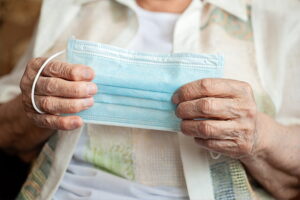Nine (9) Tips to Protect Missouri Seniors from the Delta Variant

Missouri is one of a handful of states that are currently experiencing a significant increase in persons testing positive for the COVID, particularly the Delta variant.
Health care professionals throughout the Missouri are expressing concern about the spread and increased infections.
Missouri ranks fourth in the nation for the highest rate of new cases and experienced a nearly 80% increase in cases over the first two weeks of July.
Approximately 1,600 new positive cases were reported in Missouri for the week ending on July 24th, which are the highest numbers since early February. Approximately 72% of these new cases were from the Delta variant. The Delta variant is more transmissible than earlier versions of the virus. When the Delta variant was first discovered, we were told that it was 70% more transmissible than the variant from the spring of 2020.
Over this weekend of July 23rd to 25th, twenty-seven (27) people died from COVID-19 at two (2) southwest Missouri health systems. Fifteen (15) of those patients were being treated at CoxHealth in Springfield, MO. None of the persons who died had been vaccinated. Seventy-two (72) patients have died of the virus at CoxHealth since the beginning of July. Steve Edwards, President of CoxHealth, remarked about these 15 deaths on Cox’s social media account.
In Kansas City, approximately 300 COVID-19 patients were being treated in metro hospitals as of Thursday, July 22. This very concerning.
Lower vaccination rates in Missouri and a reluctance to wear masks continue to drive these numbers. With the Delta variant becoming the primary variant, there is great concern that Missouri will experience an unprecedented number of new cases over the next few months.
Currently less than 39% of Kansas City’s population was fully vaccinated. In the St. Louis region, less than 40% St. Louis City residents are fully vaccinated. In St. Louis County, a little less than 45% are fully vaccinated. The vaccination rate varies greatly across the state. In Johnson County the rate of fully vaccinated is less than 20%.
Nationwide, 49% of the population is fully vaccinated, according to the Centers for Disease Control and Prevention.
Be aware that vaccinated and non-vaccinated person can be carriers of the variant. Vaccinated person may be asymptomatic, feel fine and not be aware that they are currently COVID positive and a carrier. This is the reason it is recommended both vaccinated and non-vaccinated persons wear mask. The mask protects others if you are a carrier and protects you, if they are a carrier.
When considering our tips to stay safe, remember that more than 50% of persons that you may be interacting with are probably not vaccinated.
Here are StaffLink’s nine (9) tips to protect seniors from being exposed to the Delta variant:
- If not vaccinated, talk to your physician immediately about if there are medical concerns with you being vaccinated. If not, get vaccinated.
- Testing is still an important part of preventing the spread of the virus. Vaccinated or not vaccinated, if you are told that you have been exposed to a “positive” person, get tested even if you are vaccinated and feeling fine. You don’t want to be an unintentional carrier and expose others.
- Vaccinated and non-vaccinated seniors should wear mask when indoors and it is not a bad idea to wear one when outdoors and when interacting with groups of persons and the public.
- Vaccinated and non-vaccinated persons (family members, professional caregivers, etc.,) interacting with seniors should always wear mask.
- If out in public, social distance from persons that are not wearing mask, even if outdoors. Remember, the virus enters and infects primarily via a person’s mouth, nose, and eyes. If you are wearing a mask, social distancing protects your eyes when talking and interacting with an unmasked person.
- If dining out, eat outdoors whenever possible-the weather is nice and will remain so for several more months in Missouri.
- Choose activities or events that are outdoors (The Muny, the St. Louis Zoo, community concerts, etc.,)
- Limit your time in public shopping spaces, elect curb-side delivery or home delivery whenever possible
- Participate in Zoom and other on-line educational, social, and religious events if appropriate and while many are still being offered
Stay safe, spend time outdoor, mask up and protect yourself and others! Let’s squash this pandemic!
The Delta Variant Is Surging in Missouri – The Atlantic
Springfield hospitals report 27 COVID deaths over weekend | The Kansas City Star
Covid Vaccine | Dashboard (mo.gov)
CoxHealth in Springfield reports 15 unvaccinated patients died from COVID-19 over weekend (msn.com)
- Fourteen (14) Spring-break Activities for Seniors and Caregivers - March 28, 2024
- It’s Our Birthday! StaffLink Is 37 Years Old! - March 21, 2024
- Eight (8) Home Care Trends for 2024 - February 22, 2024
